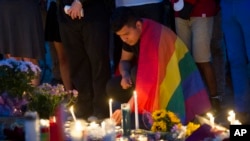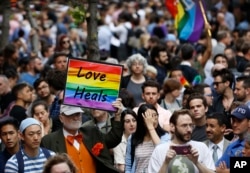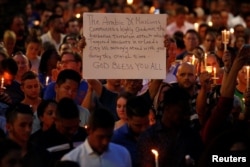"This is what it looks like to be called both a terrorist and a faggot," Hamed Sinno said from a Washington, D.C., stage early in his band's concert Monday night, to zealous cheers from the sold-out theater and a drawn out "yaaaaas!" from a gay Arab 20-something pressed up against the stage.
It was another stop on the Mashrou' Leila tour through the U.S. But unlike the shows in Boston, Detroit or Chicago, this was the first time the Lebanese group had performed post-June 12, post-Orlando Pulse, post-worst LGBT massacre in U.S. history. Since their last performance three nights prior, a gunman who may or may not be queer himself, fatally shot 49 people in a club that catered to the LGBT community, on a night advertised for Latinos.
The crowd wanted Sinno, the lead singer, to talk about Orlando. He wanted to talk about Orlando. Sinno identifies as Arab-American, queer and Muslim, an intersection where he isn’t alone. It can be a scary place.
"We all feel momentarily traumatized and touched. But then very quickly, that shit gets perverted and turned into … the same divisive rhetoric" by political parties, he says.
And then the band launched into a song called "Tayf" about the raid and subsequent shutdown by Lebanese security forces on a gay Beirut nightclub called Ghost.
The Southern Poverty Law Center tracks 34 anti-Muslim groups in the U.S. and 48 anti-LGBT groups, but the majority of the 5,462 hate crimes attributed to a single bias in 2014 — the last year for which the FBI has released statistics — are based on race or ethnicity (58.9 percent). Homicide rates for transgender women and men reached an all-time high in 2015, according to data from the Human Rights Campaign.
“As a community, we’re always perceived as sort of resilient, but that resiliency comes from, you know, being years in survival mode,” Isa Noyola, director of programs for the Transgender Law Center and a trans Latina activist, told Democracy Now. “And I know that my community has very much survived, is surviving violence on a daily basis.”
Writing for Fusion, Alan Pelaez Lopez, who identifies as an Afro-Latinx gender-nonconforming immigrant, said the nightclub shooting "cannot be isolated as a random act or purely an act of Islamic terrorism."
"[It] was an attack against a primarily young crowd of Latinx and black individuals celebrating their existence in a world that has continually tried to silence them. We can’t deny that it occurred because our [American] culture devalues the lives of women and people of color, and has through our history."
"I am still afraid," he added.
The Muslim Alliance for Sexual and Gender Diversity (MASGD) wrote in response to the Orlando shooting that "no community is a monolith — not LatinX, Muslim, queer or trans*."
"This tragedy cannot be neatly categorized as a fight between the LGBTQ community and the Muslim community," the statement read. "As LGBTQ Muslims, we know that there are many of us who are living at the intersections of different communities and identities, and we recognize the complexity of these experiences.
"Tragedies often lead people to seek someone or something to blame," the group added. "We ask our friends to resist this temptation."
But that blame, counters Hina Tai, an associate editor at The Islamic Monthly, rests on many people: political leaders; supporters of the HB2 "Bathroom" Bill; the federal government for banning some gay men from donating blood.
"Blame is on us who do not recognize that this shooting comes at an intersection of many different issues: homophobia, Islamophobia, [political-religious] extremism and gun violence — all issues that transcend religious and political lines."
It is also on those within the religious community who make LGBT Muslims feel "unwelcome in their own mosques and communities rather than promoting inclusivity."
Similarly, the day of the Orlando attack, Zaynab Shahar, took to Twitter to highlight the need for LGBT support in the Muslim community. "The existence of queer muslims doesn't negate the fact that many masjids & muslim spaces are breeding grounds for anti-LGBTQ bigotry," she wrote in a series of tweets.
Despite what some supremacist groups aspire to, there are few clear-cut spaces in this country where cultures, ethnicities, religions, races, sexualities and gender identities do not coexist.
And all of these groups — queer and Muslim and Latino, foreign-born, undocumented, faithful — have intersected before. At rallies over immigration and police surveillance and anti-Muslim attacks; and every day in the lives of people who belong to some or all of those communities.
"Reflecting on the moments and movements of solidarity over the years between Muslims and LGBTQI communities … I reflect on the many times we discovered that the same groups and legislatures that try to pass laws to restrict the rights of Muslims to worship freely are also the same groups and legislatures that push anti-LGBTQ laws," prominent Muslim and civil rights activist Linda Sarsour wrote Sunday. "We will not be divided. We have worked too hard for too long together."






